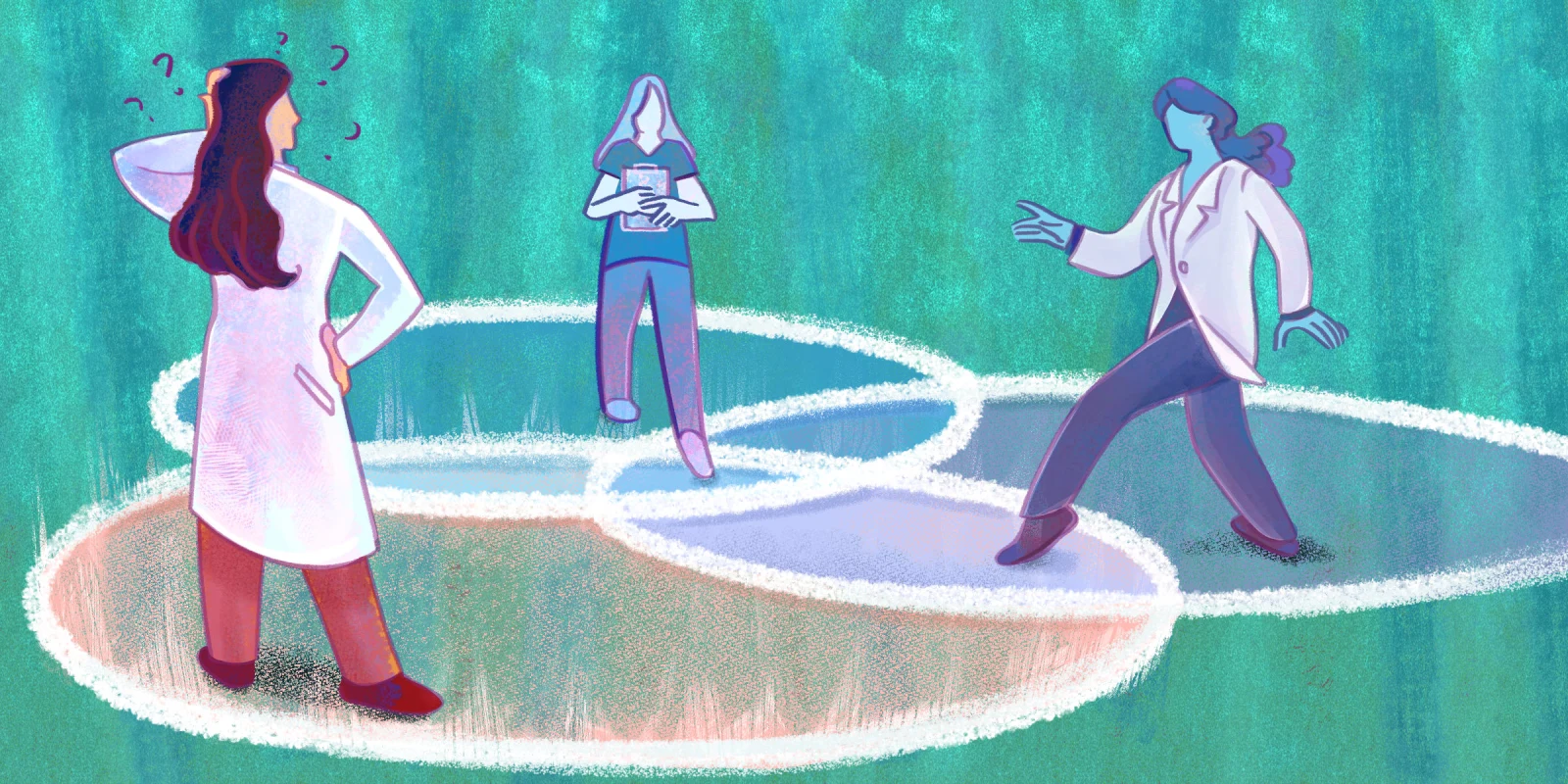There are many stock phrases about the field of medicine: medicine is hierarchical, medical school is like drinking from a firehose, see-one-do-one-teach-one, practice personalized and evidence-based medicine. Well-circumscribed roles in the medical field are another pillar of the profession, and for a good reason. You wouldn’t want anyone trying to do what they’re not trained to do, and you want to make sure things run as a well-oiled machine in critical situations.
But it’s my opinion that there are also times when “non-doctor” duties might be the exact opposite, at least in my experience.
Take, for instance, the young man with autism who was inconsolable after his father had to leave him at the psychiatric ER. For the rest of the night, I traded off with one of the nurses, sitting next to him and singing him lullabies to keep him calm. Was that my job? I don’t know. If it wasn’t, then whose job was it to comfort and keep this patient calm?
Or a young man, psychotic after ingesting multiple drugs a week before, sweating in fear at whatever he was seeing and hearing that the rest of us were not party to. Another bedside concert — this time “Row, row, row your boat” and John Legend (and some white-knuckle hand gripping) helped avert the use of more extreme measures to keep him calm. Probably not my job, but if letting go of his hand consistently escalated him, then isn’t it part of my job?
Sometimes it’s not role boundaries, but time pressure that blurs the lines. I’d say it’s been worth it whenever I spent extra one-on-one time de-escalating a manic patient with jokes, distraction, or deep breathing, or helped a traumatized patient through a behavioral plan to avert a non-epileptic seizure. Sometimes on the psychiatry unit that’s definitely not my role; it’s the role of the nurse or the mental health assistant. But isn’t my role also to help my team members? Or might my training be more appropriate to de-escalate one type of patient, and theirs more appropriate to de-escalate another?
Then there are the times when I wish the paperwork would simply disappear so I could spend the hours actually needed with my patients — although who am I kidding, that’s how all of us feel all of the time. But hours spent sitting beside a terrified catatonic patient or working on a puzzle alongside a frightened psychotic patient have more than once helped them trust me and connect enough to come out of their shell.
If it’s a job that does fall within our training and staffing is short, is it a doctor’s job to step in? Staff were shocked when I volunteered to sit with an elderly patient with dementia who needed 24/7 observation — even while asleep — during a few hours when no extra staff were available. It’s not my job, but I can write notes on my laptop just as easily in her room as in the office, right? Is there any reason why that isn’t allowed?
Sometimes when we are asked to step in, the opposite happens. It’s unclear whether it’s our job to do something like simply reassure a colleague, and then sometimes we can start to get grumpy.
It was about the third time the nurse had paged me about the patient with the low temperature. “He’s 96 degrees!” she said over and over, hysterically. “He’s unstable! He needs to go to the ICU!” I sighed with impatience (again). I knew the patient was fine. He was homeless, had recently come in off the street from a cold night, and was warming up. Last I’d seen him a couple hours ago, he’d been happily eating a snack and joking with me. I heaved myself wearily to my feet and said to the room at large, “It’s that nurse again, and she won’t leave me alone about that 96 degree patient. I better go up there just to make her feel better.” So that’s what I did. Up a few flights of stairs, said hi to the patient who was indeed sitting up in bed eating dinner, joking, all objective and subjective measures pointing to him being just fine. I found the nurse, told her I’d eyeballed the patient, gave her the subjective and objective data to support why I wasn’t concerned, and we all went on with our nights just fine.
Not a big deal, right? But I definitely complained about it. Doctors are overstressed and busy, and it seems to me that’s a perfect recipe for breeding grumpy, complaining, snarky, and impatient people. I’m not saying any of us want to be, but many of us seem to end up that way.
Sometimes it’s with non-physicians, but sometimes it’s with physicians too. I think we become so siloed in our own specialties that sometimes we forget that there are no dumb questions out there. If you’re working inpatient and someone consults your team for a simple question, it’s good to remember that sometimes you’re probably consulting them for what they’d consider a stunningly simple question too.
Then there are the times when a needless consult might turn into a needed consult; even if there’s no actionable intervention to recommend, as a consultant I’ve provided education, parental advice, connection with outpatient care, extra emotional support, and expressed concern for an undiagnosed condition to be followed up in a less acute time.
And then there are times when doing our job looks like it isn’t our job, but it actually is. Helping a medicine team break it to a chronically ill teenager that her pain might never go away, but trying not to sound dismissive? I guess that’s not for certain the psychiatry team’s job, but we are trained to talk to people about things they don’t want to hear, diseases they don’t think they have, and medicine they don’t think they need. And we are trained in helping people to do things they’re nervous about doing. So isn’t it our job to help an anxious team talk to a patient about the psychological and physical components of chronic pain?
Harkening back to one of those stock phrases about medicine: medicine is hierarchical, even if we don’t want it to be and even if we are trying to change that. Is it the doctor’s job to keep not just nurses informed of a patient’s history, plan of care, and social situation, but also support staff, from one-on-one sitters who might be beside a psychotic patient for 12 hours, or mental health assistants, who might be leading groups with patients suffering unspeakable trauma?
The roles aren’t always well-defined, we don’t know everything even within our own specialties (even if we don’t want to admit that), there are too many demands on our time, and there’s always just more, more, more work to do. But if a staff member or another doctor is calling you for help, if a patient needs some extra attention, if doing something that is needed but isn’t an assigned task might help — isn’t it our job to help?
Dr. Carolyn Rosinsky is a child/adolescent psychiatry fellow at Children's National Medical Center/George Washington University and completed her general psychiatry residency at University of Maryland/Sheppard Pratt. She is also a professional cellist and maintains an active career performing and teaching. Dr. Rosinsky is a 2021–2022 Doximity Op-Med Fellow.
Illustration by April Brust







